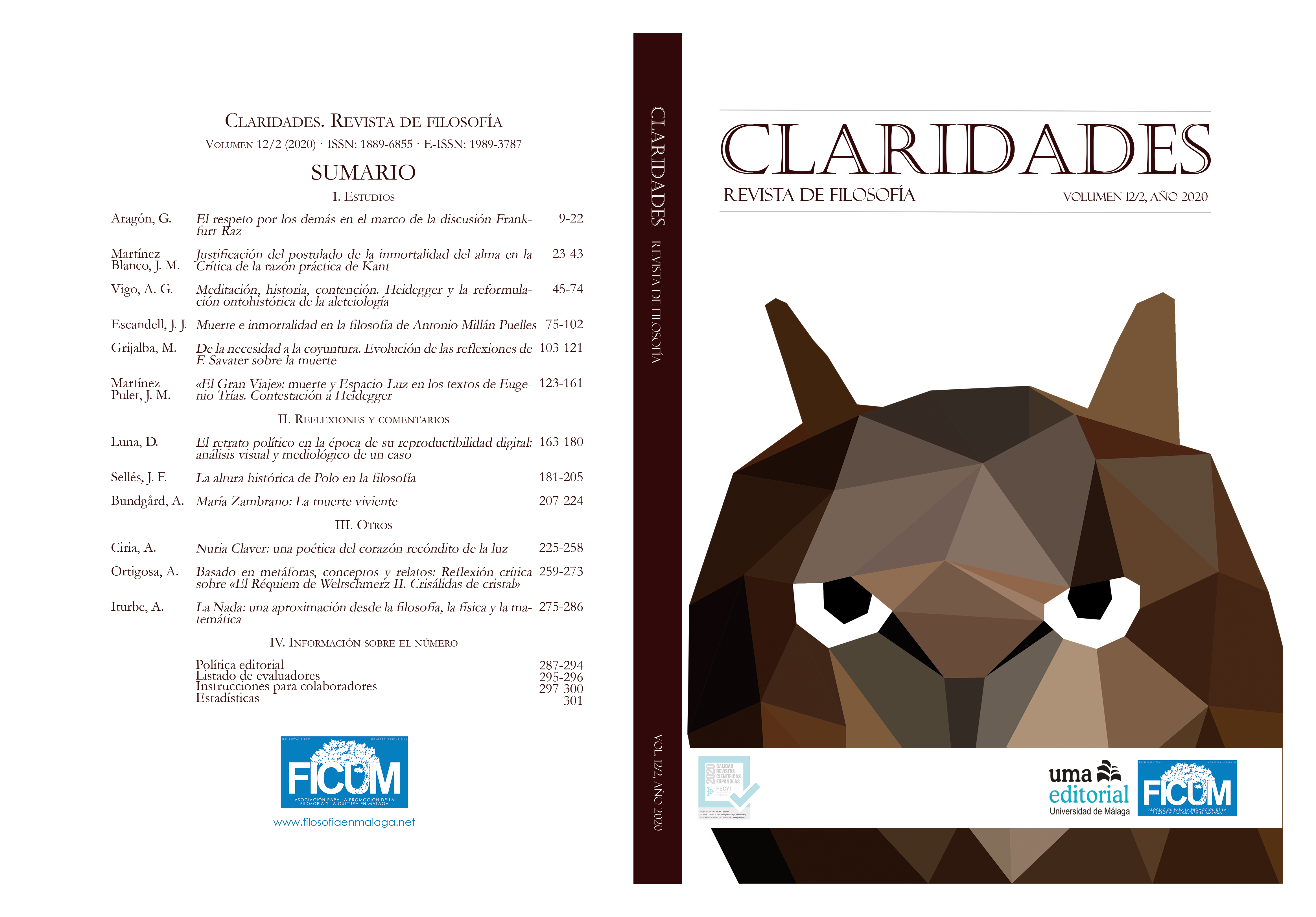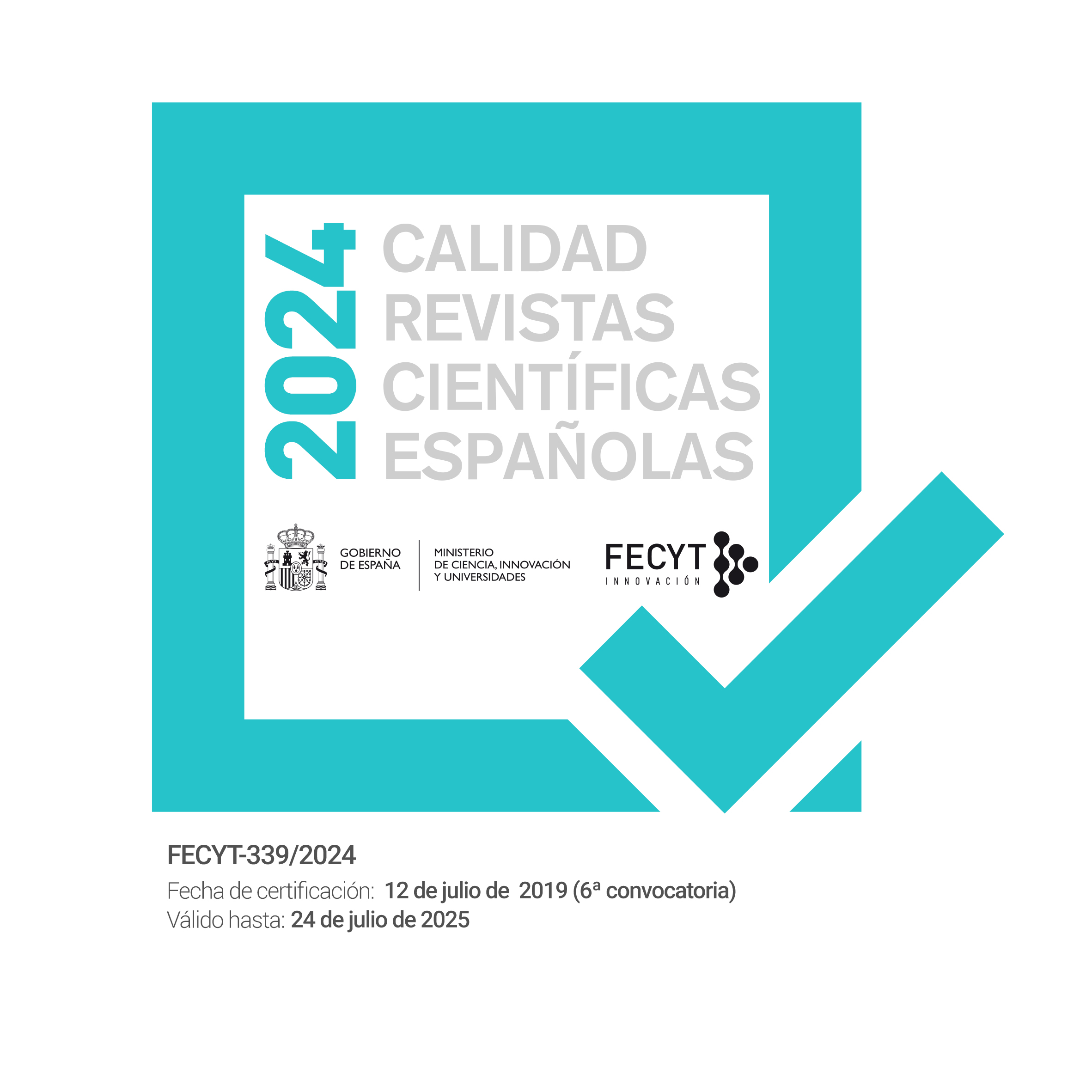The Great Journey: Death and Light-Space in the texts of Eugenio Trías. Reply to Heidegger
DOI:
https://doi.org/10.24310/Claridadescrf.v12i2.6551Keywords:
Trías, Limit, Death, Nihilism, ExistenceAbstract
This article sets out to accompany Eugenio Trías in his task of articulating a highly critical revision of Heidegger’s nihilistic existential analytic, which makes Dasein a being-for-death. For Trías, it is about to rewrite the existential analytic from the ontological framework of a hidden tradition, which links Nietzsche to Plato, as well as making it fruitful for the proposal of a tragic ontology that identifies being and time, so that Heidegger’s failed project can be completed. Likewise, this research is completed with his theorizing of the temporality of the “fronterizo”, carried out in hist latest texts, elucidated through the musical experience.
Downloads
Metrics
Publication Facts
Reviewer profiles N/A
Author statements
Indexed in
-
—
- Academic society
- N/A
- Publisher
- Asociación para la promoción de la filosofía y la cultura en Málaga (FICUM) y UMAEditorial
References
Andrés Sánchez Pascual y Juan Antonio Rodríguez Tous (ed.), Eugenio Trías: El límite, el símbolo y las sombras. Barcelona: Destino, 2003.
Albert, H., Kritik Der reinen Hermeneutik. Tübingen: Mohr Siebeck, 1994.
Anders, G., Über Heidegger. München, Beck Verlag, 2001.
Hegel, G.W.F., Enciclopedia de las ciencias filosóficas. Madrid, Ed. Alianza, 2005, §386.
Heidegger, M., Ser y Tiempo. Méjico, Fondo de Cultura Económica, 1989.
Martinez Pulet, J. M., Variaciones del límite: La filosofía de Eugenio Trías. Tesis doctoral. Accesible en esta dirección: https://repositorio.uam.es/handle/10486/12122, 2001.
Nietzsche, F., La genealogía de la moral, Alianza, Madrid, 1998.
Ortega y Gasset, J., “La idea de principio en Leibniz”, en Ortega y Gasset, J.: Obras II, Madrid: Gredos, 2012.
Plessner, H., Schriften zur Philosophie, Gesammelte Schriften IX, Frankfurt: Suhrkamf Taschenbuch, 1985.
Recalcati, M., El complejo de Telémaco. Barcelona: Anagrama, 2018.
Tomatis, A., L’Oreille et la vie. Paris: Editions Laffont, 1987.
Trías, E., Filosofía y Carnaval. Barcelona: Anagrama, 1970.
Trías, E., El artista y la ciudad. Barcelona: Anagrama, 1975.
Trías, E., Meditación sobre el poder. Barcelona: Anagrama, 1977.
Trías, E., La memoria perdida de las cosa. Madrid: Taurus, 1978.
Trías, E., Tratado de la pasión. Madrid: Taurus, 1979.
Trías, E., Filosofía del futuro. Barcelona: Ariel, 1983.
Trías, E., Los límites del mundo. Barcelona: Ariel, 1985.
Trías, E., Lógica del límite. Barcelona: Destino, 1991.
Trías, E., La edad del espíritu. Barcelona: Destino, 1994.
Trías, E., Por qué necesitamos la religión. Barcelona: Ed. Plaza y Janés, 2000.
Trías, E., Ciudad sobre Ciudad. Barcelona: Destino, 2001.
Trías, E., El Canto de las Sirenas. Madrid: Galaxia Gutenberg, 2007.
Trías, E., La Imaginación Sonora. Madrid: Galaxia Gutenberg, 2009.
Trías, E., La funesta manía de pensar. Madrid: Galaxia Gutenberg, 2018.
Downloads
Published
How to Cite
Issue
Section
License
Esta revista provee acceso libre inmediato a su contenido bajo el principio de hacer disponible gratuitamente la investigación al público. Todos los contenidos publicados en Claridades. Revista de Filosofía, están sujetos a la licencia Creative Commons Reconocimento-NoComercia-Compartirigual 4.0 cuyo texto completo puede consultar en <http://creativecommons.org/licenses/by-nc-sa/4.0>
Es responsabilidad de los autores/as obtener los permisos necesarios de las imágenes que están sujetas a derechos de autor.
Los autores/as cuyas contribuciones sean aceptadas para su publicación en esta revista conservarán el derecho no exclusivo de utilizar sus
contribuciones con fines académicos, de investigación y educativos, incluyendo el auto-archivo o depósito en repositorios de acceso abierto de cualquier tipo.
La edición electrónica de esta revista esta editada por la Editorial de la Universidad de Málaga (UmaEditorial), siendo necesario citar la procedencia en cualquier reproducción parcial o total.

















6.png)
